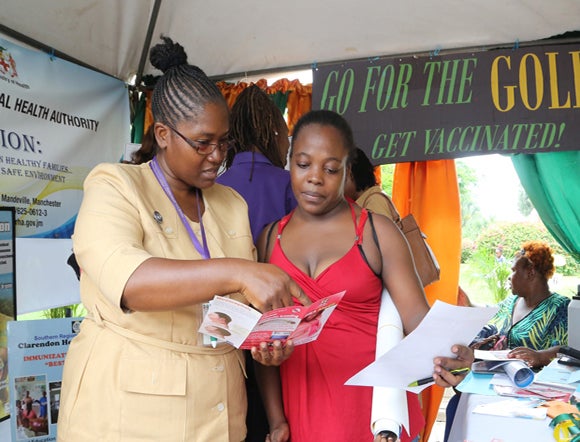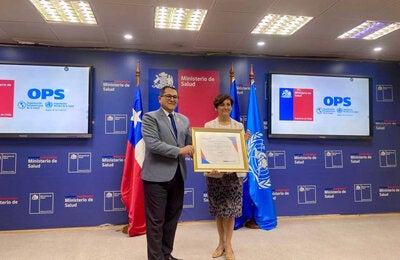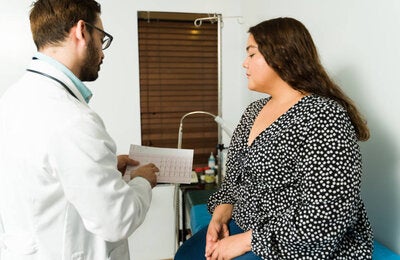
As part of Vaccination Week in the Americas (April 23 to May 2), health authorities in a number of Latin American and Caribbean countries are urging people to clean up potential mosquito breeding sites in and around their homes to prevent the spread of Zika and other mosquito-borne diseases.
Latin American and Caribbean countries are engaging the public in the fight against Aedes aegypti, the mosquito that transmits Zika, dengue, chikungunya and yellow fever
Washington, D.C., 28 April 2016 (PAHO/WHO) — As part of Vaccination Week in the Americas (April 23 to May 2), health authorities in a number of Latin American and Caribbean countries are urging people to clean up potential mosquito breeding sites in and around their homes to prevent the spread of Zika and other mosquito-borne diseases.
The focus on mosquito control reflects concern over the rapid spread of Zika to countries and territories throughout the Americas and the fact that there is currently no vaccine against the disease. Moreover, the same mosquito that transmits Zika—Aedes aegypti—also transmits dengue, chikungunya and yellow fever, which have sickened millions of people in the Americas over the past few years.
"Given the current situation with a number of mosquito-borne disease outbreaks, namely Zika, dengue and chikungunya, many countries are taking advantage of Vaccination Week in the Americas to share information on personal protection and vector-control activities," said Carissa F. Etienne, director of the Pan American Health Organization (PAHO). PAHO coordinates Vaccination Week, the largest international health initiative in the Americas, which this year is celebrating its 14th year.

Attacking Aedes
Aedes mosquitoes are well adapted to human settlements, preferring to breed in clean water that collects in man-made recipients such as bottles, cans, plastic containers and discarded tires. Successfully eliminating these potential breeding sites requires the active participation of families and communities in environmental clean-up efforts.
PAHO has developed recommendations for preventing and eliminating Aedes breeding sites. The recommendations urge individuals, families and communities to:
- Make sure all tanks, water deposits and containers are covered and sealed to keep out mosquitoes.
- Change the water and brush the insides of sinks and water barrels at least once a week. Change water in flower vases and pet bowls weekly as well.
- Safely dispose of unused containers that can collect water and serve as breeding sites.
- Turn over any containers that cannot be thrown away and protect them from rain.
- Pour out water from flower pots and planters and replace with damp sand.
- Keep swimming pools treated according to recommendations.
- Clean all drains and gutters.
- Keep grass short and weed-free, and keep patios clean.
One of the countries that is mobilizing communities to undertake such efforts during Vaccination Week in the Americas is El Salvador, where health authorities are also carrying out fumigation. Haiti is urging its population to prevent and destroy mosquito breeding sites while also advising women, in particular, on how to protect themselves against mosquito bites.
Also in the Caribbean, Saint Lucia is organizing community clean-up campaigns to reduce vector breeding sites, Sint Maarten is sponsoring health information sessions on vector control for children 17 and under, and Barbados and Trinidad and Tobago are disseminating information on prevention and control of mosquito-borne diseases in general. Bolivia, meanwhile, is intensifying surveillance of measles, rubella and acute flaccid paralysis in areas where Zika is circulating.
In addition to mosquito-control efforts, at least 21 countries are promoting other complementary prevention activities during this year's Vaccination Week. The activities include deworming, vitamin A supplementation, distribution of oral rehydration therapy, chronic disease and obesity screening, prenatal checks, dental health activities, childhood growth and development screening, work wellness and school health programming, and vaccination of pets.
About Vaccination Week in the Americas
Vaccination Week in the Americas began in 2003 as part of the regional response to an endemic outbreak of measles in Venezuela and Colombia. To prevent future such emergencies, the ministers of health of the Andean countries proposed a coordinated international immunization initiative. Since then, Vaccination Week has taken the benefits of immunization to more than 580 million people of all ages and has become a key driver of progress in immunization in the Americas.
PAHO engages in technical cooperation with its member countries to organize and carrying out Vaccination Week each year, providing assistance with planning, resource mobilization, social communication campaigns, procurement of vaccines and supplies, and evaluation. The PAHO Revolving Fund also provides key support for Vaccination Week by helping PAHO member countries pool their resources to procure high-quality vaccines, syringes and other supplies at the lowest prices.
PAHO, founded in 1902, is the oldest international public health organization in the world. It works with its member countries to improve the health and the quality of life of the people of the Americas. It also serves as the Regional Office for the Americas of WHO.
Links
— Vaccination Week in the Americas 2016
— Infographic: How to prevent mosquito breeding sites
— https://twitter.com/opsoms #GetVax



